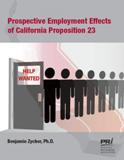Suspension of AB 32 Would Add 150,000 Jobs in California in 2011 and More than 500,000 in 2012, According to New Study
San Francisco A new study by the Pacific Research Institute, a free-market think tank based in San Francisco, finds that the approval of Proposition 23, suspending the implementation of AB 32, would add nearly 150,000 jobs in California in 2011, more than a half million jobs by 2012, and more than 1.3 million jobs by 2020. The Prospective Effects of Proposition 23 on Employment in California by Benjamin Zycher, Ph.D., PRI senior fellow in Business and Economic Studies, examines the historical relationship between employment and total energy consumption in California to derive projections of the impact of Prop. 23 on employment. If approved by voters, Prop. 23 would suspend the implementation of the California Global Warming Solutions Act of 2006 (AB 32) until the California unemployment rate declines to 5.5 percent or less for four consecutive quarters.
The studys estimates are based upon the future reductions in total energy consumption attendant upon the implementation of AB 32, as estimated by the staff of the California Air Resources Board (CARB). The paper uses the historical relationships among employment, aggregate output, the capital stock, and total energy consumption for California to derive projections of the effect of AB 32 upon aggregate employment in the state for the period 2010 to 2020. The assumption is that the implementation of AB 32 would be suspended during this period.
Employment and energy consumption drive each other, wrote Dr. Zycher, workers use energy to accomplish their tasks. There exists no evidentiary basis upon which to predict a fundamental change in the employment/energy relationship in the state. In 2009, the ratio of employment to the population aged 18-65 was 66.8 percent. According to the study, if Prop. 23 were enacted, that ratio will rise to 67.5 percent in 2020. If AB 32 were implemented, it will fall to 62.4 percent in that year, an employment loss equal to about 5 percent of the working-age population.
Sound economic analysis provides no basis to conclude that the employment impact of AB 32 would be positive, a reality directly relevant to the choices facing public officials and the California electorate this November, concluded Dr. Zycher.

